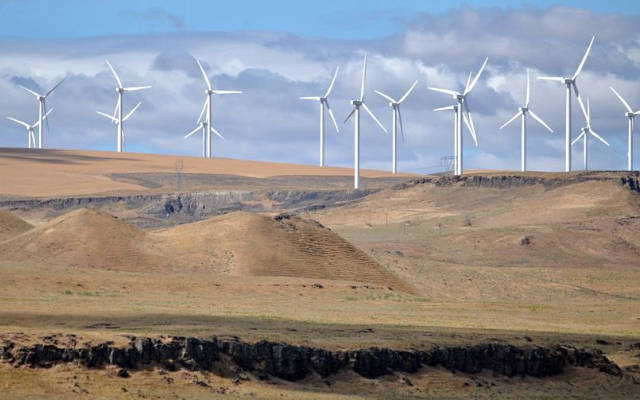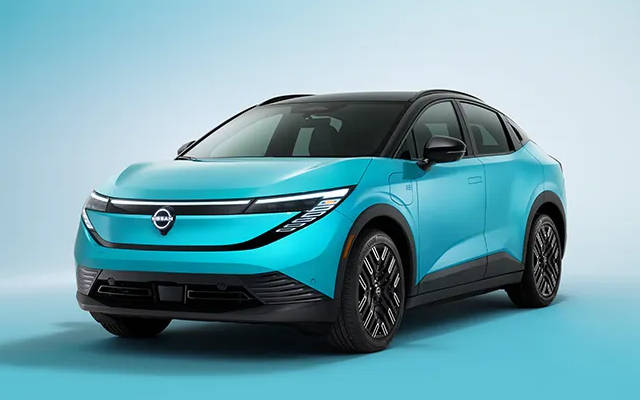 EDITOR'S PICK
EDITOR'S PICK
Africa: The Green Transition's Surprising New Home
21 Aug 2025 | Synopsis
 Africa emerges as unexpected renewable energy leader, "leapfrogging" fossil fuels with 60% of world's best solar resources. Kenya targets 100% renewables by 2030, Ethiopia builds largest hydro project. Chinese clean tech exports up 153%. By 2030, renewables will account for 80%+ of new capacity. Economic necessity drives energy independence through domestic clean sources.
Africa emerges as unexpected renewable energy leader, "leapfrogging" fossil fuels with 60% of world's best solar resources. Kenya targets 100% renewables by 2030, Ethiopia builds largest hydro project. Chinese clean tech exports up 153%. By 2030, renewables will account for 80%+ of new capacity. Economic necessity drives energy independence through domestic clean sources.Cybertruck Insurance Dilemma: Tesla's Challenge Ahead
21 Aug 2025 | Synopsis
 Tesla's Cybertruck faces an insurance crisis as major providers like GEICO and Hanover rescind coverage due to high repair costs, limited production data, and underwriting challenges. Owners report cancellations and steep premiums, while Tesla's own insurance offers partial relief in select states. The issue threatens future sales and highlights the gap between bold design and real-world support, leaving buyers uncertain and Tesla under pressure to respond.
Tesla's Cybertruck faces an insurance crisis as major providers like GEICO and Hanover rescind coverage due to high repair costs, limited production data, and underwriting challenges. Owners report cancellations and steep premiums, while Tesla's own insurance offers partial relief in select states. The issue threatens future sales and highlights the gap between bold design and real-world support, leaving buyers uncertain and Tesla under pressure to respond.The Lithium Wars: EnergyX, Tesla, and the Race to Reinvent Battery Supply
20 Aug 2025 | Synopsis
 EnergyX and Tesla are racing to reshape lithium supply chains. Energyx's modular LiTAS™'s system extracts lithium from brine with high efficiency, while Tesla builds a $1B acid-free refinery in Texas. Smackover, AR is EnergyX's likely launch site, offering infrastructure and proximity to EV markets. Meanwhile, sodium-ion batteries emerge as a low-cost alternative, potentially disrupting lithium demand but not replacing it. The future of batteries is diversified, fast, and fiercely competitive.
EnergyX and Tesla are racing to reshape lithium supply chains. Energyx's modular LiTAS™'s system extracts lithium from brine with high efficiency, while Tesla builds a $1B acid-free refinery in Texas. Smackover, AR is EnergyX's likely launch site, offering infrastructure and proximity to EV markets. Meanwhile, sodium-ion batteries emerge as a low-cost alternative, potentially disrupting lithium demand but not replacing it. The future of batteries is diversified, fast, and fiercely competitive.China's 600 Wh/kg Lithium-Metal Battery Breakthrough: Hype or Real Progress?
19 Aug 2025 | Synopsis
 Chinese researchers report lithium-metal pouch cells reaching 600 Wh/kg - nearly double today's EV batteries. Published in Nature, the work uses a novel electrolyte and shows promising density but only ~100 cycles, far short of EV needs. Scaling, safety, and cost remain unproven. While credible science, it's early-stage. Current leaders like CATL, BYD, Amprius, and SES offer lower but durable densities; no one is yet close to 600 Wh/kg for real EVs.
Chinese researchers report lithium-metal pouch cells reaching 600 Wh/kg - nearly double today's EV batteries. Published in Nature, the work uses a novel electrolyte and shows promising density but only ~100 cycles, far short of EV needs. Scaling, safety, and cost remain unproven. While credible science, it's early-stage. Current leaders like CATL, BYD, Amprius, and SES offer lower but durable densities; no one is yet close to 600 Wh/kg for real EVs.2026 Nissan LEAF: Performance Meets Value in America's Most Affordable EV
19 Aug 2025 | Synopsis
 2026 Nissan LEAF redesign: 303-mile range, Tesla Supercharger access, starts $29,990 - America's cheapest new EV. 75kWh battery, 35-min fast charging, crossover styling vs old hatch. SV+ trim $34,230, undercuts 2025 by $1,960 despite more features. Available fall 2025. Targets affordable EV market vs premium competitors. Google built-in, panoramic roof, flush door handles. Could revive pioneering nameplate.
2026 Nissan LEAF redesign: 303-mile range, Tesla Supercharger access, starts $29,990 - America's cheapest new EV. 75kWh battery, 35-min fast charging, crossover styling vs old hatch. SV+ trim $34,230, undercuts 2025 by $1,960 despite more features. Available fall 2025. Targets affordable EV market vs premium competitors. Google built-in, panoramic roof, flush door handles. Could revive pioneering nameplate.
 EVWorld Exclusive
EVWorld Exclusive
Mining's PR Mirage: Why Sandvik's Metal-Free EV Is a Clever Illusion
27 Oct 2025 |  Sandvik's "eNimon" sculpture - a nonfunctional EV made without metals - is a PR stunt, not innovation. Framed as a warning against anti-mining sentiment, it sidesteps real concerns about environmental harm and responsible extraction. While EVs require mined materials, most offset their production emissions within 1-2 years. The campaign oversimplifies the debate, mocking critics instead of addressing how mining can evolve. It's a clever illusion - but one that dodges accountability.
Sandvik's "eNimon" sculpture - a nonfunctional EV made without metals - is a PR stunt, not innovation. Framed as a warning against anti-mining sentiment, it sidesteps real concerns about environmental harm and responsible extraction. While EVs require mined materials, most offset their production emissions within 1-2 years. The campaign oversimplifies the debate, mocking critics instead of addressing how mining can evolve. It's a clever illusion - but one that dodges accountability.
Infinite Machine: Design-Driven Urban EVs with European Aspirations
27 Oct 2025 |  Infinite Machine, a Brooklyn-based EV startup, unveiled its P1 scooter and Olto moped at EICMA 2025, targeting European urban riders. Backed by Andreessen Horowitz and Nico Rosberg, the company blends design and performance but has yet to confirm production or deliveries. With prototypes and press buzz, it's not vaporware - but remains unproven. European rollout begins in 2026 via select dealers.
Infinite Machine, a Brooklyn-based EV startup, unveiled its P1 scooter and Olto moped at EICMA 2025, targeting European urban riders. Backed by Andreessen Horowitz and Nico Rosberg, the company blends design and performance but has yet to confirm production or deliveries. With prototypes and press buzz, it's not vaporware - but remains unproven. European rollout begins in 2026 via select dealers.
The Uncomfortable Truth Behind Our Push For Clean Tech
27 Oct 2025 |  China's rare earth export controls are forcing the West to reshore toxic industries once outsourced. Mining and refining rare earths - essential for EVs and defense - carry major environmental risks. Projects in Nebraska and Wyoming face local opposition over health and pollution concerns. The West must now balance its need for green tech materials with the challenge of minimizing environmental and public health impacts at home. Clean energy, it turns out, has a dirty supply chain.
China's rare earth export controls are forcing the West to reshore toxic industries once outsourced. Mining and refining rare earths - essential for EVs and defense - carry major environmental risks. Projects in Nebraska and Wyoming face local opposition over health and pollution concerns. The West must now balance its need for green tech materials with the challenge of minimizing environmental and public health impacts at home. Clean energy, it turns out, has a dirty supply chain.
Toyota Century: Electrified Prestige and Philosophical Pivot
27 Oct 2025 |  Toyota's Century project marks a bold leap into ultra-luxury EV territory, challenging Rolls-Royce, Bentley, and Cadillac with Japanese craftsmanship and electrified ambition. Once a domestic icon, the Century now signals Toyota's intent to globalize prestige mobility - quietly, deliberately, and with high-voltage precision.
Toyota's Century project marks a bold leap into ultra-luxury EV territory, challenging Rolls-Royce, Bentley, and Cadillac with Japanese craftsmanship and electrified ambition. Once a domestic icon, the Century now signals Toyota's intent to globalize prestige mobility - quietly, deliberately, and with high-voltage precision.
Unlocking Heat's Hidden Potential: How a Nanoscale Discovery Could Transform Everyday Tech
24 Oct 2025 |  A recent nanoscale physics breakthrough reveals heat can transfer across tiny gaps far more efficiently than expected - up to 100 times greater than classical predictions. This could revolutionize cooling and energy systems in electronics, EVs, and smart appliances. While engineering challenges remain, early applications may emerge within 3-5 years, with broader consumer adoption possible in the next decade. The future of heat management may be silent, solid-state, and radically efficient.
A recent nanoscale physics breakthrough reveals heat can transfer across tiny gaps far more efficiently than expected - up to 100 times greater than classical predictions. This could revolutionize cooling and energy systems in electronics, EVs, and smart appliances. While engineering challenges remain, early applications may emerge within 3-5 years, with broader consumer adoption possible in the next decade. The future of heat management may be silent, solid-state, and radically efficient.
 28 Oct 2025 03:25:50 UTC |
RECENT PODCASTS
What Battery Chemistry Wins - Ontario Nuclear Investment - Battery Storage Boom
SEARCH RSSTREAM
 69 New Postings In Past 24 Hours
69 New Postings In Past 24 Hours
Category:mobility
Region:AsiaPacific
Date:27 Oct 2025
Category:mobility
Region:NoAmerica
Date:27 Oct 2025
Category:policy
Region:NoAmerica
Date:27 Oct 2025
Category:mobility
Region:NoAmerica
Date:27 Oct 2025
Category:finance
Region:NoAmerica
Date:27 Oct 2025
Category:finance
Region:NoAmerica
Date:27 Oct 2025
Category:mobility
Region:NoAmerica
Date:27 Oct 2025
Category:mobility
Region:NoAmerica
Date:27 Oct 2025
Category:mobility
Region:NoAmerica
Date:27 Oct 2025
Category:finance
Region:NoAmerica
Date:27 Oct 2025
Category:finance
Region:Global
Date:27 Oct 2025
Category:finance
Region:NoAmerica
Date:27 Oct 2025
Category:recall
Region:NoAmerica
Date:27 Oct 2025
Category:energy
Region:NoAmerica
Date:27 Oct 2025
Category:finance
Region:NoAmerica
Date:27 Oct 2025
Category:review
Region:AustralPacific
Date:27 Oct 2025
Category:mobility
Region:AsiaPacific
Date:27 Oct 2025
Category:mobility
Region:SoAmerica
Date:27 Oct 2025
Category:energy
Region:NoAmerica
Date:27 Oct 2025
Category:mobility
Region:NoAmerica
Date:27 Oct 2025